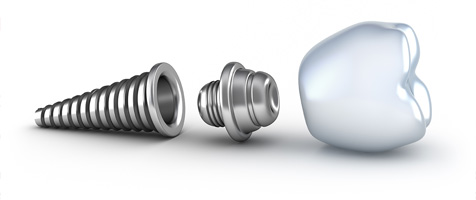
Questions & Answers
What are dental implants?
A dental implant is an artificial tooth that is placed into your jaw using a metal screw to hold a bridge or a replacement tooth. Unlike traditional bridgework, a dental implant is actually more “tooth saving” because it doesn’t depend on surrounding teeth for support. Dental implants feel and look so natural that you won’t even realize that you had a missing tooth at one time. There is no reason why you should have to hide that smile because dental implants give you your confidence back. It improves chewing and allows you to speak, smile, and eat comfortably without feeling embarrassed. Dental implants last a lifetime and studies have shown improvements in success rates for this procedure.What can dental implants do and are they for me?
With dental implants your dentist at Pink Elephant Dental Center can replace a single tooth or several teeth without affecting the surrounding teeth, support bridgework and get rid of removable dentures, or support a denture by making it more stable and comfortable for you.Anyone who has missing teeth, good oral health, and sufficient bone in their jaw to help the implants stay in place are great candidates for dental implants. Also, the best candidates are free from periodontal disease. If a patient doesn’t have adequate bone for implants, bone grafts can be placed before dental implants take place (look under the “procedure” portion to see how this works).
Types of dental implants?
Endosteal implants take place in the bone and is the commonly used implant method. This procedure is usually used on patients who have bridgework or removable dentures. Endosteal implants hold one or more prosthetic teeth in place with screws, cylinders, or blades.Subperiosteal implants take place on the bone and are placed on top of the jaw. The metal framework’s post sticks out through the gum to hold the artificial teeth. This method is commonly used for patients who can’t wear dentures or have small bone height.
What are the advantages of having a dental implant over dentures or a bridge?
Dental implants have many advantages, and in fact, they might be the best solution for someone who is missing a tooth. Here are some reasons why dental implants are better than having dentures or a bridge: Esthetic: Dental implants are natural looking and feel like your own teeth! No one can tell that you have implants because they look so real. Since dental implants are joined together with your bone, bone loss and gum recession is prevented (unlike dentures and bridgework).Tooth-saving: Unlike bridgework, dental implants don’t affect the health of your neighboring teeth since they don’t have to be altered to support the implant. As a result, your own teeth are left untouched and not in risk of causing long term problems.
Confidence: Dental implants give you the confidence that you would never fully feel with dentures. You can speak, eat, and smile without any worries or embarrassment! So, say goodbye to unsteady dentures and messy denture glues/gels.
Reliable: Dental implants have a high success rate and are the best option for replacing a missing tooth! Dental implants in the front lower jaw calls for a 98-100% success rate; replacements in the front upper jaw calls for a 90-95% success rate.
There are other benefits of dental implants, and these include:
- Dental implants slow down the shrinking of bone and gum tissue, which prevents premature aging.
- Dental implants are the most advanced procedure for tooth replacement.
- Implants never grow decay
- They never require root canals.
- Dental implants preserve the jawbone, which also prevents premature aging.
- It doesn’t matter how old you are, you can still get dental implants!
- Nine out of ten implants last longer than 15 years!
How does the procedure work?
You, your dentist and your periodontist at Amedcoa Dental Center a branch of Pink Elephant Dental Studio first need to discuss which dental implants are best for you and how they should be placed. Your periodontist will come up with a treatment plan specifically meant to meet your needs. Here are some treatment options that are offered through dental implants:Single Tooth Replacement: To replace one tooth, one implant and one crown can do the job. Since a dental implant replaces the root of your tooth, your bone is preserved better. First, a screw or a cylinder will be placed in your jaw. For two months, the bone and implant will be left to bond together to help form an anchor for your replacement tooth. At this time, you can wear a “temporary” tooth over the implant until the anchor is formed. You might have to come back to get an extension on your implant, which is a small metal post called an abutment, unless the implant already has an extension attached. Your gums will have to heal after the procedure for a couple of weeks. This step isn’t always necessary, and your periodontist will let you know if it is. Finally, your new tooth, or crown, will be placed on the abutment.
Several Teeth Replacement: For several missing teeth, your periodontist can replace them with implant-supported bridges. Like single tooth replacements, first a screw or a cylinder is placed in your jaw. For six months, the bone and implants have to bond together to form an anchor. Again, a temporary tooth can be worn during this time. You might have to get extensions (abutments) attached to the implants if they don’t already have them. Finally, bridges (replacement teeth) are attached to the abutments.
Replacing All of Your Teeth: To replace all of your teeth, an implant-supported full bridge or denture can be placed in your jaw. First, a screw or a cylinder is placed in your jaw. Then for the next two to six months, the bone and implants have to bond together to form an anchor. Again, a temporary tooth can be worn during this time. You might have to get extensions (abutments) attached to the implants along with a connecting device that allows several crowns to be attached, but this is only if the implants don’t already have extensions attached to them. Depending on how many implants you need, your new teeth can be tightened down to the connecting device, or dentures can be snapped on or off. Finally, full bridges or dentures will be attached to the connecting device.
Sinus Augmentation: Due to poor bone quality and closeness to the sinus, upper back jaw dental implants are difficult to do. If bone is lost in that area because of periodontal disease or tooth loss, there might not be enough bone for dental implants. Usually, a sinus augmentation can help with this problem by lifting the sinus floor and developing bone so implants can take place. One way to do this is an incision is made so the bone is exposed. A tiny circle is cut into the bone, and this piece is lifted so the sinus cavity is seen. Then, your dentist will fill the space with bone graft material. Finally, the dentist will close the incision and healing will begin. For about four to twelve months, the bone is allowed to develop so you can have dental implants.
Ridge Modification: Sometimes deformities in the upper and lower jaw can result in not enough bone for dental implants to take place. This can occur from wearing dentures, periodontal disease, injury, or trauma. Ridge modification can solve this problem. First, the dentist will lift the gum so the bony defect is exposed, and it is filled with bone or bone substitute. The incision is closed and the healing process can start. For four to twelve months, the bone is allowed to develop so you can have dental implants.[/pane]

